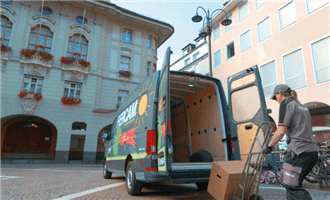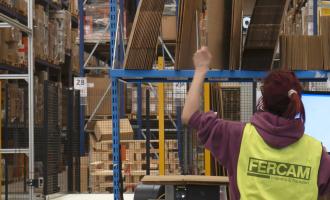
2 November 2021 - by: Silvia Pedrotti
Advantages and disadvantages of the various modes of transporting goods
Each mode of transport has its own characteristics and peculiarities, useful to consider when choosing it for the shipment of your goods. Which transport vehicle is the most suitable and why? Which mode allows you to reduce the impact of logistics activities on the environment? Let us compare the different available options.

Road transport: it is the most used mode of transport for short and medium distances, and is especially appreciated for its versatility. It is also suitable for the transport of dangerous goods (ADR) and can arrive in almost any country, subject to customs clearance of the goods where necessary. In recent years, vehicles used for road transport have evolved by making giant steps towards eco-friendly technologies. After decades of diesel trucks, technological innovations in the field of alternative traction now offer vehicles powered by electricity and hydrogen or methane fuel that allow us to circulate while protecting the environment.
Rail transport: it is a very advantageous mode in terms of carrying capacity, especially over long distances (over 500 km), but it is less flexible due to the infrastructures to which it belongs: the routes are restricted to the railway lines and the timetables are defined by the hirer of the service. This type of transport is often used in combination with the road mode, in order to reach every final destination, while taking advantage of the advantages of rail transport. The train has always been identified as the most ecological means of transport, as it allows CO2 emissions to be reduced by two thirds compared to a Euro VI diesel truck.
Air transport: it is the fastest mode of transport. It is also often combined with road or rail transport to serve the delivery of goods to their destination. From the point of view of sustainability, we are still in the experimentation phase to reduce polluting emissions: according to studies reported by the University of Padua, the first electric commercial flights are scheduled for 2035. At the same time, there is a lot of interest in the development of alternative aviation fuels (SAFs) produced from organic waste material and which, if mixed with normal fossil fuel, could come into use as early as the middle of this decade.
Ship transport: the sea sector is still suffering the consequences of a series of concomitant factors, which have caused an increase in the freight cost and some variations in the overall hold capacity. Nonetheless it still remains the cheapest transport solution. Normally the service is completed by road transport. From the point of view of environmental sustainability, we are seeing virtuous though slow progress: according to a new report by Clean Cargo TM, the sector global averages for CO2 emissions per container per kilometer decreased by 5.6% respectively for the Dry index and 2.5% for the Reefer index.
In most cases, multiple modes of transport are used for the same shipment. For example, if goods have to be shipped from Milan to Rhodes, it may be necessary to organize a road transport to get to the port or airport to travel by ship or plane and, once arrived on the Greek island, be transferred to destination by truck or train. Different aspects affect the costs, duration and reliability of shipments: choosing to rely on industry experts allows you to optimize your resources, freeing yourself from the uncertainty of an inefficient choice.
Sources
(*) Università di Padova - https://ilbolive.unipd.it/
(**) Aviation Report - https://www.aviation-report.com/primo-studio-al-mondo-sulle-emissioni-in-volo-utilizzando-carburante-sostenibile-per-aviazione-saf-su-aeromobile-commerciale/
(***) ShipMag - https://www.shipmag.it/le-navi-inquinano-meno-scendono-le-emissioni-delle-portacontainer-la-ricerca/
Rail transport: it is a very advantageous mode in terms of carrying capacity, especially over long distances (over 500 km), but it is less flexible due to the infrastructures to which it belongs: the routes are restricted to the railway lines and the timetables are defined by the hirer of the service. This type of transport is often used in combination with the road mode, in order to reach every final destination, while taking advantage of the advantages of rail transport. The train has always been identified as the most ecological means of transport, as it allows CO2 emissions to be reduced by two thirds compared to a Euro VI diesel truck.
Air transport: it is the fastest mode of transport. It is also often combined with road or rail transport to serve the delivery of goods to their destination. From the point of view of sustainability, we are still in the experimentation phase to reduce polluting emissions: according to studies reported by the University of Padua, the first electric commercial flights are scheduled for 2035. At the same time, there is a lot of interest in the development of alternative aviation fuels (SAFs) produced from organic waste material and which, if mixed with normal fossil fuel, could come into use as early as the middle of this decade.
Ship transport: the sea sector is still suffering the consequences of a series of concomitant factors, which have caused an increase in the freight cost and some variations in the overall hold capacity. Nonetheless it still remains the cheapest transport solution. Normally the service is completed by road transport. From the point of view of environmental sustainability, we are seeing virtuous though slow progress: according to a new report by Clean Cargo TM, the sector global averages for CO2 emissions per container per kilometer decreased by 5.6% respectively for the Dry index and 2.5% for the Reefer index.
The selection criteria
Each mode of transport therefore has advantages and disadvantages and there is no single answer, not even for the same type of goods. For example, if I wanted to ship a box of toys from Hong Kong to Venice, I could theoretically choose from all the variants listed, but factors such as delivery terms and transport rates will be the discriminating variables to make the choice. Do I need it quickly? Am I low on budget? Is my destination an important logistics center or a small provincial town?In most cases, multiple modes of transport are used for the same shipment. For example, if goods have to be shipped from Milan to Rhodes, it may be necessary to organize a road transport to get to the port or airport to travel by ship or plane and, once arrived on the Greek island, be transferred to destination by truck or train. Different aspects affect the costs, duration and reliability of shipments: choosing to rely on industry experts allows you to optimize your resources, freeing yourself from the uncertainty of an inefficient choice.
Sources
(*) Università di Padova - https://ilbolive.unipd.it/
(**) Aviation Report - https://www.aviation-report.com/primo-studio-al-mondo-sulle-emissioni-in-volo-utilizzando-carburante-sostenibile-per-aviazione-saf-su-aeromobile-commerciale/
(***) ShipMag - https://www.shipmag.it/le-navi-inquinano-meno-scendono-le-emissioni-delle-portacontainer-la-ricerca/
Share


 Language
Language

























